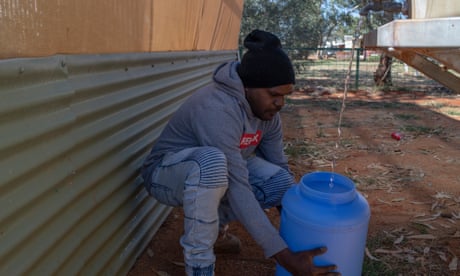- by foxnews
- 04 Apr 2025
Remote NT community not told about $5m contract to fix uranium in water supply
Remote NT community not told about $5m contract to fix uranium in water supply
- by theguardian
- 16 May 2022
- in news

Residents of a remote Indigenous community who have been left to drink uranium-contaminated water for a decade will get a new treatment plant by the end of the year under a plan by the Northern Territory government to address the issue.
Details of the project were revealed in a statement to the Australian stock exchange by engineering firm Clean TeQ Water, which announced it had signed a $5m contract in March to build an ion-exchange water filtration system for the 350-person community at Laramba.
The Central Lands Council CEO, Lesley Turner, said residents of Laramba had so far been left without details of the treatment plant and had been forced to pay for bottled water while they wait.
The development comes as the community awaits the result of a legal challenge to a Northern Territory Civil and Administrative Tribunal decision in July 2020 that found landlords had no obligation to install filter taps in homes to ensure water was safe to drink. In Laramba the NT government is both landlord and supplies drinking water to the community. A decision is expected on Monday.
Drinking water in remote Indigenous communities within the Northern Territory is managed by Indigenous Essential Services (IES), a wholly-owned subsidiary of the government-owned utility company Power and Water Corporation (PWC). IES has no staff, no offices and pays a fee to its parent company for administration services.
Guardian Australia contacted both NT Health and the EPA, but neither had received an application for approvals on the treatment plant.
PWC has previously directed questions about progress on the $28m spend to the NT government, including as recently as late April.
When Guardian Australia asked PWC about the situation at Laramba in October last year, it could not confirm any work had taken place.
Around that time representatives from PWC travelled to the Pilbara in Western Australia on a fact-finding trip to visit the remote community of Yandeyarra, where an ion-exchange water treatment plant has been operating for about 10 years.
PWC was contacted for comment but declined to comment.
The NT minister for essential services and water security, Eva Lawler, was expected to make an announcement regarding the water treatment plant this week.
- by foxnews
- descember 09, 2016
'I traveled for an entire year for free - and saved $15K'
Hailey Learmonth explored Australia without paying rent, thanks to pet sitting. She saved $15,000, lived on farms, and embraced remote work to travel on a budget.
read more


